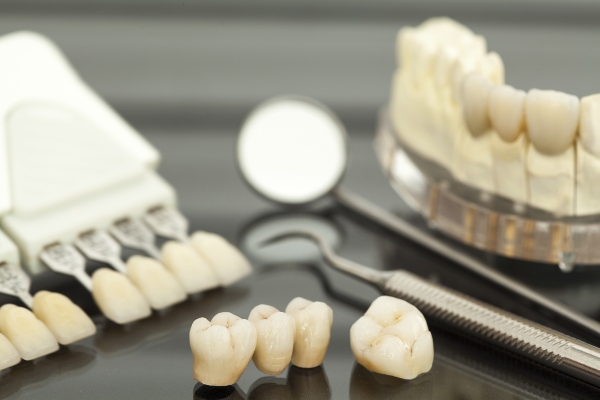3 Common General Dentistry Treatments

The routine oral care that you receive on an ongoing basis involves general dentistry. You should see a general dentist first if you have any symptoms of dental disorders, as early intervention is often the key to preventing costly damage and extreme discomfort. Additionally, you should also visit periodically even when you do not have any symptoms in the interest of preserving oral health.
What general dentistry treatments are among the most common?
Dentists provide preventive care to avoid oral health disorders. They can also provide basic therapeutic and restorative services to treat relatively minor dental issues. While dental health is unique to individuals, in that genetics, oral hygiene habits, and several other factors impact tooth and gum problems, there are several treatments that are fairly common among all dental patients.
1. Cleanings and exams
Over time, plaque and tartar can build up on the teeth. Brushing and flossing help control this but cannot prevent it altogether. Dentists recommend that patients come in for cleanings on a regular basis to get rid of the buildup that at-home oral hygiene alone cannot remove. Cleanings typically involve using hand tools to remove tartar, polishing the teeth with a motorized handpiece, flossing, and rinsing. During a cleaning, you may also receive a fluoride treatment to prevent tooth decay and reverse it in its early stages.
Dental exams typically occur at the same time as dental cleanings. This often starts with X-rays to examine the teeth and look for any problems that might be affecting the parts that are not visible. The dentist then looks in your mouth for signs of cavities, gum disease, or other problems. This is important because many dental disorders do not cause symptoms in the early stages, but catching them early may mean less extensive treatment.
The frequency of exams and cleanings is determined by the dentist. Most patients have cleanings twice a year. People with severe dental problems may require more frequent exams, while people with excellent oral health may only need to see the dentist annually. There are four types of cleanings that occur, though many patients go years with just a typical cleaning. The cleanings are: prophylaxis dental cleaning, scaling and root planing, periodontal maintenance cleaning, and gross debridement cleaning.
2. Fillings
With a combination of diligent flossing and brushing at home combined with regular general dentistry exams and cleanings, some patients can avoid tooth decay. For patients who do develop cavities, a filling is the most common restorative treatment. Fillings require the decayed material to be removed with a drill and the resulting hole filled back in with a sturdy material that can stand up to the pressures of chewing. Traditional fillings use a silver amalgam to restore the tooth, but there are also tooth-colored filling materials made of compounds of ceramic or plastic.
Fillings are designed to be durable, but there are still steps to take to ensure this protective treatment lasts as long as possible. First of all, continue to brush and floss normally but gently, and use a soft-bristled toothbrush to avoid damaging the filling. Also, consider using mouthwash and toothpaste without alcohol to avoid staining the filling or weakening the stability of the filling. You should also avoid extremely cold or hot foods to reduce the amount of expansion and contraction on the filling.
3. Sealants
Sealants are a preventive treatment that involves coating the teeth with a plastic resin that forms a protective barrier against decay by bonding to the tooth. The teeth have grooves where bacteria can collect and start forming a cavity. Sealants help prevent this by getting down into the grooves and smoothing them out as the material hardens.
Sealants are typically used as a preventative in childhood, but adults can have them too as long as their teeth are healthy. You can prolong the protection you receive by having the treatment repeated every three to five years, which is typically how long sealants last. Sealants do not replace brushing and flossing but help to make at-home dental hygiene more effective at preventing cavities.
Conclusion
General dentistry involves treatments that are routine and basic. The services dentists provide can be restorative, therapeutic, or preventative in nature. It is important to keep your dental appointments and maintain open communication with your dentists. These treatments can preserve both your oral health and your physical health, which is why you should thoroughly discuss each with your dentist if you have a dental concern.
Request an appointment here: https://brimhalldentalgroup.com or call Brimhall Dental Group at (661) 249-1122 for an appointment in our Bakersfield office.
Check out what others are saying about our dental services on Yelp: General Dentist in Bakersfield, CA.
Recent Posts
Seeing a general dentist for regular checkups should be part of your dental care routine. This dental professional can help maintain and even improve your teeth and gum health. Asking the right questions can help you know more about proper oral care. Below are some of the questions you can ask your general dentist during…
A general dentist will tell you all of the benefits of flossing on a regular basis. Flossing should be a very important part of your daily oral hygiene routine. Brushing your teeth is the first round of defense in fighting tooth decay but do not underestimate the value of flossing. When you get into the habit…
General dentistry commonly handles toothaches among other dental concerns. While this is a routine issue that is easily treatable, it is common for patients to have several questions about it and what they should do if they experience it. Here we will answer some commonly asked general dentistry questions and advice on the best ways…
A general dentist spends some of their time providing services for seniors. Dental health is closely related to overall health and that becomes more obvious as a person ages. For example, gum disease can lead to serious health issues like heart disease and diabetes. These are conditions that have the potential to be life-threatening at…


